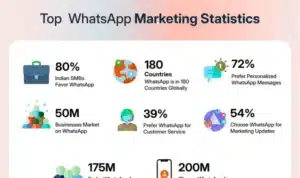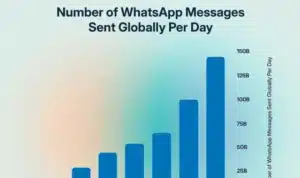In today’s digital age, WhatsApp has become more than just a messaging application — it has evolved into a universal language of communication that connects billions of people across continents. Whether it’s friends sharing laughter, families keeping in touch, or businesses engaging with customers, WhatsApp User Statistics serves as the heartbeat of modern connectivity.
With its seamless interface, free access, and real-time messaging, it has redefined how people express emotions, collaborate professionally, and build global relationships. From text and video calls to business catalogs and community channels, WhatsApp has transformed into an all-in-one communication hub trusted by users worldwide.
WhatsApp User Statistics provides valuable insight into its unmatched global reach, growth patterns, and cultural impact. This report explores the platform’s global expansion, country-wise user base, demographics, business integration, and emerging trends that continue to shape digital communication. As we analyze these numbers, we uncover not just statistics — but a powerful story of how technology unites humanity through simplicity and connection.
Global Snapshot of WhatsApp User Base
WhatsApp User Statistics User Statistics continues to dominate the global messaging market, connecting more than 3 billion active users monthly. Owned by Meta Platforms Inc., it has evolved from a simple text app to a multi-dimensional tool for messaging, calling, payments, and business services.
Global WhatsApp Usage
| Metric | Data | Notes |
| Total Users | 3 Billion+ | As of 2024–2025 global estimate |
| Daily Messages Sent | 100 Billion+ | Includes texts, photos & videos |
| Top Country | India – 535 Million | Largest WhatsApp market globally |
| Market Reach | 180+ Countries | Supported in over 60 languages |
| WhatsApp User Statistics Business Accounts | 200 Million+ | Growing rapidly among SMEs |
Country-Wise WhatsApp User Statistics
The influence of WhatsApp User Statistics differs by geography, but its popularity remains unparalleled. Countries like India, Brazil, and Indonesia lead the charts due to affordable mobile internet, high smartphone penetration, and the platform’s simplicity.
- India: Approximately 535 million users, the highest worldwide. WhatsApp User Statistics is deeply embedded in daily communication — from family chats to business updates.
- Brazil: Over 140 million active users. WhatsApp User Statistics is used for both personal and professional conversations, often replacing traditional SMS.
- Indonesia: Around 90 million users, where WhatsApp User Statistics competes closely with Telegram and Line, but remains the top messenger.
- USA: Over 75 million users, mainly among international communities and business users.
- Mexico: About 77 million users, making it the region’s preferred app for quick communication.
This country-wise breakdown shows WhatsApp’s universal adaptability. Whether for business marketing in Brazil or family chats in India, WhatsApp has redefined digital connection worldwide.
Demographics and Usage Behavior
WhatsApp’s success lies in its diverse audience. It appeals to nearly every age group, from teens to seniors, because it’s simple, secure, and reliable.
- Age Group 18–35: Core user base; heavily engaged through media sharing and status updates.
- Age Group 35–50: Uses WhatsApp User Statistics for work, family coordination, and small business communication.
- Seniors (50+): Growing adoption due to video calls and family groups.
Gender distribution is almost equal, with a slight lean toward male users in business regions. On average, a user spends 38–45 minutes daily on WhatsApp, exchanging texts, photos, and videos. Status updates, voice messages, and group chats remain the most-used features, showing how WhatsApp User Statistics blends convenience with personal connection.
WhatsApp Business and Marketing Impact
Beyond personal messaging, WhatsApp Business has transformed how brands connect with consumers. It allows businesses to share catalogs, automate messages, and respond instantly to customer inquiries.
- Over 200 million active business accounts operate on WhatsApp globally.
- 98% open rate for WhatsApp messages — far higher than email or SMS.
- 70% of users report they feel more connected to brands that message them on WhatsApp.
Small enterprises use WhatsApp for customer service, order confirmations, and delivery updates. In countries like India and Brazil, it even serves as a mini-commerce platform — enabling people to sell homemade products or provide local services. The rise of the WhatsApp API has further allowed large corporations to manage thousands of automated customer conversations efficiently.
Global Growth Trends and Market Analysis
WhatsApp’s journey from a simple messaging tool (founded in 2009) to a global communication ecosystem is extraordinary.
Its growth remains steady — adding millions of new users every quarter.
- Asia-Pacific: Continues to lead due to young populations and mobile-first economies.
- Latin America: High daily engagement; users rely on WhatsApp for social and political communication.
- Europe: Mature markets with strong usage among professionals.
- Africa: Rapidly emerging market; WhatsApp often doubles as an internet gateway.
Meta’s introduction of features like Channels, Communities, Payments, and AI bots has kept user engagement high. These innovations position WhatsApp as a one-stop platform for messaging, news, commerce, and group management — expanding its role far beyond traditional chat apps.
Regional Insights: Asia, Europe, Africa & Americas
Asia
In Asia, WhatsApp dominates markets like India, Indonesia, and the Philippines. Affordable data and widespread smartphone access make it the default communication tool for millions. Businesses use it for delivery notifications, government updates, and local commerce.
Europe
Countries like the UK, Germany, and Spain show mature adoption. Privacy features such as end-to-end encryption are highly valued. WhatsApp remains the go-to tool for group coordination, especially among professionals.
Africa
In Africa, WhatsApp’s role goes beyond chatting. It helps small businesses reach customers in areas with limited access to computers. In Kenya and Nigeria, WhatsApp is used for digital learning, political campaigns, and community announcements.
Americas
Brazil and Mexico have among the highest WhatsApp penetration rates globally. Users here spend an average of 60 minutes daily on WhatsApp. The app’s reliability and data efficiency make it irreplaceable in both urban and rural communities.
Emerging Trends in WhatsApp Usage
As WhatsApp continues to evolve, several key trends define its future:
- AI Integration: Meta’s AI chatbot and message-suggestion tools improve communication and customer support.
- Business Payments: WhatsApp Pay is expanding across more countries, encouraging digital commerce.
- Communities & Channels: These features support large-scale group communication for schools, NGOs, and news outlets.
- Voice & Video Calls Growth: Daily calls exceed 2 billion, proving WhatsApp’s dominance in communication.
- Multi-device Use: Users can now connect the same account across multiple devices seamlessly.
- Status & Stories: Borrowing from Instagram’s success, WhatsApp Status attracts 500 million daily users.
- Marketing Automation: Companies automate welcome messages and notifications to personalize experiences.
- Privacy Upgrades: Users control who can see their online status or profile photo, enhancing trust.
Together, these innovations shape WhatsApp into a multi-layered platform blending communication, business, and technology.
Privacy, Security & Data Protection
WhatsApp’s strength lies in trust. It provides end-to-end encryption by default, ensuring that only the sender and receiver can read messages. Even Meta cannot access private conversations.
The app has also added two-step verification, encrypted backups, and disappearing messages to enhance privacy. Despite misinformation concerns, WhatsApp continues to improve its moderation systems and media authenticity tools to reduce spam and fake news. Security remains a core reason behind WhatsApp’s massive user loyalty.
Future Outlook for WhatsApp
The next decade for WhatsApp looks promising. Analysts predict it may reach 4 billion users by 2030, supported by continuous feature expansion.
Future possibilities include:
- AI-driven message assistants to summarize chats and automate replies.
- Seamless payments for small businesses and peer transfers.
- Deep integration with Meta’s ecosystem, including Instagram and Facebook.
- Enhanced privacy protocols for global compliance.
- Sustainability focus, with optimized data consumption and digital inclusion.
As digital life accelerates, WhatsApp will continue to redefine how humans interact — privately, professionally, and globally.
FAQs
Q1. What is the total number of WhatsApp users worldwide?
Ans: WhatsApp User Statistics currently has over 3 billion monthly active users, making it the most widely used messaging platform in the world. Its simplicity, reliability, and strong privacy features have made it the preferred choice for billions of people, uniting users across regions and languages.
Q2. Which country has the most WhatsApp users?
Ans: India leads globally with around 535 million active users, followed by Brazil, Indonesia, and the USA. The app’s accessibility and free messaging service have made it an essential communication tool for people across all walks of life.
Q3. How many businesses use WhatsApp Business?
Ans: More than 200 million businesses actively use WhatsApp User Statistics Business to engage with customers and manage communication. It helps small and large enterprises send updates, provide support, and grow relationships in a direct, conversational way.
Q4. What are the most used features on WhatsApp?
Ans: WhatsApp User Statistics users most frequently use text messaging, voice and video calls, group chats, and status updates. The app also allows easy file sharing and quick media exchange, making it both personal and professional in nature.
Q5. Is WhatsApp secure for personal communication?
Ans: Yes. WhatsApp offers end-to-end encryption for all messages, calls, and shared media, ensuring that only the sender and receiver can read or listen to them. This strong privacy focus keeps user data safe from unauthorized access.
Q6. How much time does an average user spend on WhatsApp daily?
Ans: On average, users spend 35 to 45 minutes daily chatting, sharing photos, and making calls on WhatsApp. Its user-friendly design and instant connection make it one of the most engaging apps on smartphones.
Q7. What is WhatsApp’s future growth potential?
Ans: With ongoing innovations like AI features, business tools, and payment options, WhatsApp’s user base is expected to grow even further. Experts predict it may surpass 4 billion users within the next few years as its ecosystem continues to expand globally.
Final Thoughts
WhatsApp User Statistics has evolved from a simple messaging app into a global communication powerhouse that connects billions of people across cultures and continents. It has become a bridge that unites families separated by distance, empowers small businesses to reach customers instantly, and enables students and professionals to share knowledge effortlessly. Beyond communication, WhatsApp User Statistics plays a vital role in education, healthcare, and governance, especially in developing regions where accessibility matters most.
Its growth is not merely measured in numbers but in the emotional, cultural, and social bonds it helps strengthen every day. As the digital world continues to expand, WhatsApp User Statistics remains the heartbeat of human connection — proving that technology, when built on trust and simplicity, can bring people closer, faster, and stronger than ever before.









